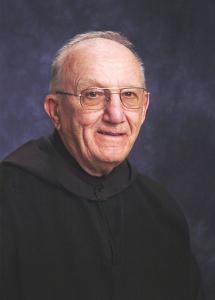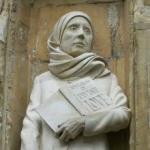 I was saddened to hear a couple of days ago that Fr. Wilfred Thiesen died this past week at the age of 95. He was a son of Minnesota who spent the majority of his years as a member of the Benedictine community at Saint John’s Abbey on the campus of St. John’s University in Collegeville, Minnesota. He professed simple vows as a Benedictine monk in 1950, followed by final profession in 1953. Subsequently he completed divinity studies at St. John’s seminary and was ordained to the priesthood in 1956 (the year I was born).
I was saddened to hear a couple of days ago that Fr. Wilfred Thiesen died this past week at the age of 95. He was a son of Minnesota who spent the majority of his years as a member of the Benedictine community at Saint John’s Abbey on the campus of St. John’s University in Collegeville, Minnesota. He professed simple vows as a Benedictine monk in 1950, followed by final profession in 1953. Subsequently he completed divinity studies at St. John’s seminary and was ordained to the priesthood in 1956 (the year I was born).
Wilfred also earned impressive academic credentials, earning an M.S. in physics in 1962 from the University of Colorado and a PhD in the history of science from the University of Wisconsin in the history of science in 1972. He was a physics professor at St. John’s University for more than four decades, awarded professor emeritus by the SJU faculty upon his retirement from the classroom.
Wilfred became the liaison officer for the Collegeville Institute for Ecumenical and Cultural Research in 1975, a position he relished for forty years because of its intellectual stimulation. He was a perfect fit for this role because of his ability to translate monastic and Catholic spirituality to people of all faith traditions. It was in this capacity that I first met Wilfred when I was a resident scholar at the CIECR from January to May of 2009. In his role as liason Wilfred was present at all institute functions, both formal and informal. I quickly came to appreciate his wonderful sense of humor and his comfort with being an unexpected iconoclast.
For instance, Wilfred openly criticized the Catholic church he loved for its continuing refusal to ordain women, often working this into his homilies when it was his turn to preach. This made other Benedictines uncomfortable but endeared him to the eight or nine resident scholars whom came from several different from faith traditions. The other regular Benedictine presence at institute functions was Kilian McDonnell, who is still with us in his 103rd year. Kilian was the founder of the institute in the 1960s; in his heyday, he was a world-renowned and well-published theologian who turned to writing poetry in his ninth decade. He has five poetry collections in print with irreverent titles like Swift, Lord, You are Not and God Drops and Loses Things.
Wilfred and Kilian clearly loved each other, but had a good-natured rivalry that was undoubtedly decades old. They were like a comedy routine, constantly kidding and criticizing each other about everything imaginable. One time after Sunday morning mass, the resident scholars were invited into the monks’ residence for lunch, a special occasion that only happened twice in the four months I was at Collegeville. We resident scholars met Kilian at an appointed place to be led into the labyrinthine residence, but Wilfred was missing. Upon being asked whether we should wait for Wilfred before proceeding, Kilian laughed heartily. “I’m willing to wait for scholars,” Kilian said, “but I’m definitely not waiting for Wilfred!” I’m quite sure that Kilian is pissed that Wilfred got to move on to his reward first and will have a lot to say to Wilfred about it when he sees him next.
While in residence at Collegeville I began writing short, personal essays that, three years later, turned into this blog that is now in its thirteenth year and has produced three books (and counting). Wilfred has appeared in those essays a number of times; I’d like to share two of them with you. Neither is about Wilfred specifically, but he appears as an important person in each of them. The first relates a conversation in which Wilfred said something that, without exaggeration, changed the way I think about many things related both to my teaching profession and my faith journey.
The second essay, one that has landed on this blog more than once in different forms, shares a brief portion of a lunch conversation I had with Wilfred that, once again without exaggeration, opened the door wide for the early elements of a spiritual transformation that developed in the months that followed, a transformation that I continue to work out and be grateful for fifteen years later.
One of my last memories from my 2009 sabbatical was a barbecue in early May, just about a week before my time at Collegeville ended. The scholars and three or four monks from the Abbey were sitting on the patio behind one of the small resident scholar apartments, enjoying the weather and the lake in front of us after a typically harsh Minnesota winter. Wilfred, who had very little regard for how an eighty-year-old Benedictine monk and priest should dress, was wearing shorts that did little to hide his knobby knees and skinny elderly legs. He was also wearing a white t-shirt that said WWW on the front. On the back, in similarly large letters, it said World Wide Wilfred. I took a picture which I, unfortunately, cannot find now. But that image of Wilfred in casual garb, holding a beer, and enjoying a conversation with my fellow resident scholar Mary (probably about why women should be ordained–something Mary did not agree with) will always be etched in my memory.
In John Bunyan’s Pilgrim’s Progress, when Christian makes it to the gates of the Celestial City after many trials and tribulations, he is greeted by the gatekeeper with the following from Matthew 25:
Well done, good and faithful servant. Enter into the joy of your Lord.
I have no doubt that this is how Wilfred was greeted last week as he moved on to his reward. Well done, Wilfred.












